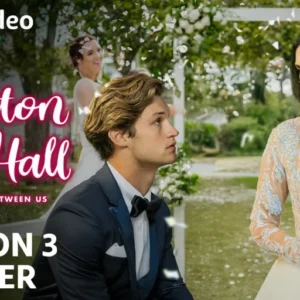On a chilly spring day in New York City, Rachel Zegler, the 23-year-old actress known for her role as Maria in West Side Story and the titular character in Disney’s live-action Snow White, was spotted walking her goldendoodle, Lenny, in a low-key, makeup-free appearance. Dressed in an oversized denim jacket, grey sweatpants, Adidas sneakers, and a black headband pushing back her dark hair, Zegler’s somber demeanor and tired expression caught the attention of onlookers and paparazzi. A green star-shaped pimple patch on her forehead added to the impression of a young star grappling with the weight of recent controversies surrounding her role in Disney’s Snow White remake, which has been described as a commercial and critical disappointment. This article explores Zegler’s recent public appearance, the controversies surrounding her Snow White role, and the broader implications of the scrutiny she faces as a young Latina actress in Hollywood.
A Somber Stroll Amidst Controversy
Zegler’s appearance in New York City on April 2025, as reported by the Daily Mail, painted a picture of an actress under strain. The article described her as looking “deflated” and “somber,” attributing her mood to the poor box office performance of Snow White, which grossed only $43 million domestically and $87 million globally in its opening weekend against a reported production and marketing budget of at least $350 million. The film, released on March 21, 2025, has been mired in controversy since its announcement, with Zegler at the center of much of the criticism. Her casual, makeup-free look and tired appearance were interpreted by some as a reflection of the toll these challenges have taken on her.
This public sighting came at a time when Zegler has been navigating a storm of backlash, not only for her comments about the original 1937 Snow White animated film but also for her outspoken political views, particularly her pro-Palestine activism. The Daily Mail noted that her “strong political opinions” have been blamed by some for the film’s underperformance, with Disney reportedly bracing for a $115 million loss due to the film’s poor reception and an online “review-bombing” campaign. The image of Zegler walking her dog, far from the glamour of red carpets, underscores the human side of a young actress caught in a highly publicized cultural and political firestorm.

The Snow White Controversy: A Timeline of Criticism
The controversy surrounding Disney’s Snow White remake began long before its release. When Zegler was cast as Snow White in June 2021, some conservative-leaning Disney fans criticized the decision, arguing that a Latina actress did not fit the character’s traditional description of having “skin as white as snow.” Zegler, whose mother is Colombian and father is Polish, faced racist harassment, including profane insults shouted outside her apartment. In response, she expressed pride in playing a Latina princess, noting that Snow White holds cultural significance in Spanish-speaking countries.
Zegler’s comments about the original 1937 film further fueled the backlash. In a 2022 interview with Extra, she described the animated classic as “extremely dated” in its portrayal of women and criticized the focus on a love story with a prince who “literally stalks” Snow White. She emphasized that the remake would focus on Snow White’s leadership and self-discovery, stating, “She’s not going to be saved by the prince, and she’s not going to be dreaming about true love.” These remarks were perceived by some fans as disrespectful to the beloved original, prompting accusations that Zegler was dismissive of Disney’s legacy.
The backlash intensified in 2023 when interview clips resurfaced on social media, particularly on TikTok, where users criticized Zegler’s tone and accused her of promoting a “woke” agenda. A TikTok video by @CosyWithAngie, viewed over 9.5 million times, argued that criticizing Disney princesses as passive is not feminist, asserting that not every woman needs to be a leader. Other critics, including conservative commentators, labeled Zegler a “walking PR disaster” for Disney, with some questioning why she accepted the role if she held such a low opinion of the original film.
Zegler’s political activism added another layer of controversy. Her vocal support for Palestine, including a tweet stating “Free Palestine” after thanking fans for watching the Snow White trailer, reportedly strained her relationship with Disney and her co-star Gal Gadot, who plays the Evil Queen and is a known advocate for Israel. According to Variety, producer Marc Platt flew to New York to ask Zegler to moderate her social media posts, but she stood her ground. Additionally, her Instagram post following Donald Trump’s 2024 reelection, where she wrote, “May Trump supporters and Trump voters and Trump himself never know peace,” drew further criticism, though she later apologized for letting “emotions get the best of me.”
The Impact of Public Scrutiny
Zegler’s makeup-free, tired appearance in New York City reflects the broader pressures she faces as a young actress in the public eye. The BBC described her as a “battleground on social media,” caught in a toxic debate fueled by culture wars, racism, and political polarization. Film critic Kelechi Ehenulo called Zegler a victim of these culture wars, noting that actors from underrepresented backgrounds, like Zegler, often become targets for backlash. The Vanity Fair article highlighted the support Zegler has received from fans and industry figures, with film critic David Ehrlich praising her talent and potential for future roles. However, the relentless criticism has taken a toll, as evidenced by her somber demeanor during her recent outing.
The scrutiny Zegler faces is not unique but part of a pattern affecting young female actresses, particularly those from marginalized backgrounds. The BBC cited Millie Bobby Brown’s experiences with media bullying as a parallel, noting that women in the public eye are often judged more harshly than their male counterparts. Zegler herself has spoken about the challenges of fame, telling Variety that she refuses to take a social media break because it would give her critics “the satisfaction of knowing they hurt me.” Her resilience in the face of harassment, including death threats and racist attacks, speaks to her determination to remain authentic.
A Polarizing Figure in Hollywood
Despite the controversies, Zegler has garnered significant support for her talent and courage. Her performance in Snow White has been praised by critics, even as the film itself received mixed reviews, with a 42% rating on Rotten Tomatoes. The Butler Collegian argued that the criticism of Zegler is rooted in misogyny and racism, pointing out that her co-star Ansel Elgort faced less scrutiny for serious allegations during their West Side Story collaboration. Zegler’s fans admire her for speaking her mind, as highlighted by Teen Vogue, which celebrated her for defending peers like Halle Bailey and addressing systemic issues in Hollywood.
Zegler’s recent Broadway run in Romeo + Juliet alongside Kit Connor further showcased her versatility, with the production recouping its $7 million investment and attracting the youngest audiences in Broadway history. Crew members from Snow White also praised her professionalism, with Connor noting that she was described as “an angel” to work with. These achievements underscore Zegler’s potential to rise above the current backlash and continue her ascent in Hollywood.
Conclusion: The Human Cost of Fame
Rachel Zegler’s makeup-free walk in New York City, with her tired expression and casual attire, offers a glimpse into the human cost of fame for a young actress navigating a high-profile controversy. The Snow White remake, intended to modernize a classic fairy tale, has instead become a lightning rod for debates about race, feminism, and political activism. Zegler’s comments about the original film, her casting as a Latina Snow White, and her outspoken views have made her a polarizing figure, drawing both vitriol and admiration.
As Disney grapples with the financial fallout of Snow White’s underperformance, Zegler remains a symbol of resilience and authenticity. Her somber appearance reflects the weight of public scrutiny, but her continued engagement with her craft—on stage, screen, and social media—demonstrates her commitment to her values and career. The challenges she faces highlight broader issues in Hollywood, where young women, particularly those from underrepresented backgrounds, are often unfairly targeted. As Zegler moves forward, her talent and determination will likely outshine the controversies, proving that she is more than the sum of her critics’ complaints.




